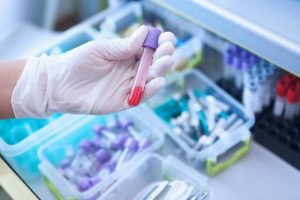Learn about the impact of medications on NIPT (Non-Invasive Prenatal Testing). Understand which medications may affect the test results and the precautions to take before undergoing NIPT.
- Introduction
- What is NIPT (Non-Invasive Prenatal Testing)?
- You Can Have NIPT (Non-Invasive Prenatal Testing) While on Medication
- How Medication Affects NIPT (Non-Invasive Prenatal Testing)
- Common Medications and Precautions Before NIPT (Non-Invasive Prenatal Testing)
- Self-Medication During Pregnancy is Not Recommended
- Conclusion
Introduction
NIPT (Non-Invasive Prenatal Testing) is a test that can diagnose chromosomal abnormalities in the fetus using only the mother’s blood sample.
Generally, testing is possible even while taking medication. However, it is necessary to discontinue heparin before the test.
NIPT (Non-Invasive Prenatal Testing) itself may not be affected by certain medications, but these medications can still impact pregnancy and the fetus. In this article, we explain the effects of medications on NIPT (Non-Invasive Prenatal Testing) and pregnancy.
What is NIPT (Non-Invasive Prenatal Testing)?
NIPT (Non-Invasive Prenatal Testing) is a screening test, similar to maternal serum marker tests, that assesses the likelihood of congenital abnormalities in the baby using only the mother’s blood sample.
In addition to non-invasive prenatal testing (NIPT), there are other prenatal diagnostic tests such as maternal serum marker tests, fetal ultrasound (fetal dock), amniocentesis, and chorionic villus sampling (CVS).
- Maternal serum marker tests and fetal ultrasound are less invasive to the fetus but cannot provide a definitive diagnosis.
- Amniocentesis and CVS have high accuracy but involve puncturing the uterus, which poses a significant risk to the fetus.
NIPT (Non-Invasive Prenatal Testing) can be performed with just a blood sample and boasts a very high testing accuracy, including a 99.9% sensitivity for detecting trisomy 21, the cause of Down syndrome.
It is a test that is gaining attention because it allows for the safe and highly accurate detection of chromosomal abnormalities in the fetus.
You Can Have NIPT (Non-Invasive Prenatal Testing) While on Medication
NIPT (Non-Invasive Prenatal Testing) analyzes fragments of the baby’s DNA present in the pregnant woman’s blood to check for chromosomal abnormalities.
Since the test only requires a blood sample, NIPT (Non-Invasive Prenatal Testing) can be performed even if you are taking medication.

How Medication Affects NIPT (Non-Invasive Prenatal Testing)
While NIPT (Non-Invasive Prenatal Testing) can be performed even if you are taking medication, certain medications may cause errors in the test results.
However, by discontinuing medication only before the test, accurate testing is possible.
Precautions regarding medications and NIPT (Non-Invasive Prenatal Testing) will be discussed later, so please refer to this if you are considering undergoing NIPT (Non-Invasive Prenatal Testing).
Common Medications and Precautions Before NIPT (Non-Invasive Prenatal Testing)
NIPT (Non-Invasive Prenatal Testing) can detect chromosomal abnormalities in the fetus with just a blood sample, so the test itself is possible even if you are taking medication.
However, some medications may cause errors in the test results or affect the baby in the womb.
Here, we explain the precautions before undergoing NIPT (Non-Invasive Prenatal Testing) using common medications as examples.
Heparin
Heparin should be temporarily discontinued before undergoing NIPT (Non-Invasive Prenatal Testing), or you should be tested before using it.
This is because heparin is said to have a high potential to alter the DNA in serum. Performing NIPT (Non-Invasive Prenatal Testing) while using heparin injections often results in errors.
Based on heparin’s half-life of 4 to 6 hours, we recommend discontinuing its use for at least 12 hours, preferably over 48 hours, before undergoing NIPT (Non-Invasive Prenatal Testing).
Antipyretic Analgesics
Antipyretic analgesics themselves do not affect NIPT (Non-Invasive Prenatal Testing), but there are rare cases where some medications can impact the test. For example, acetaminophen, commonly found in cold medicines and safe for pregnant women, may sometimes affect NIPT (Non-Invasive Prenatal Testing). If possible, refrain from taking such medications before the test.
Additionally, some medications are known to affect the fetus, so caution is necessary.
Ibuprofen, an ingredient found in antipyretic analgesics, is known to increase the risk of miscarriage if taken for more than a week in early pregnancy. In late pregnancy, it can affect labor and the newborn.
Non-steroidal anti-inflammatory drugs (NSAIDs) containing ibuprofen should be avoided, especially in late pregnancy, as they can cause the fetal ductus arteriosus to constrict.
Allergy Medications
During pregnancy, the increased secretion of female hormones leads to an increase in circulating blood volume and body fluid retention, making nasal mucosa congestion and swelling more likely.
As a result, pregnant women are more prone to rhinitis, and symptoms of allergies such as hay fever are likely to worsen.
If you are taking allergy medications, the medication itself does not affect NIPT (Non-Invasive Prenatal Testing).
However, nasal decongestants such as naphazoline hydrochloride and tetrahydrozoline hydrochloride, which are found in medications for nasal congestion and hay fever, are known to also have uterine contraction effects.
Therefore, it is important to consult with your primary care physician before taking these medications.
Over-the-Counter Cold Medicines
Over-the-counter cold medicines are not specific treatments like antibiotics or antiviral drugs; instead, they provide symptomatic relief for fever, runny nose, cough, and other symptoms.
While taking these medications does not affect NIPT (Non-Invasive Prenatal Testing) itself, there are rare instances where some medications may impact the test results.
As previously mentioned, NSAIDs found in antipyretic analgesics and vasoconstrictors such as naphazoline hydrochloride and tetrahydrozoline hydrochloride may affect the fetus.
It is essential to read the package insert to check whether over-the-counter medications are safe for pregnant women.
If you have any concerns, be sure to consult your primary care physician.
Herbal Medicine
The likelihood of herbal medicine affecting NIPT (Non-Invasive Prenatal Testing) is low.
However, although herbal medicines are often perceived as safe because they are made from plants, some can induce miscarriage.
Herbal preparations containing rhubarb, coptis, and gentian root are said to induce miscarriage and should not be used.
Herbal medicines can be difficult to judge because their ingredients are not consistent, and there is a lack of data on how much of these ingredients are absorbed by the body.
They are not necessarily safe, so it is crucial to consult your primary care physician before using them.
Stomach Medicine
Using stomach medication is unlikely to affect NIPT (Non-Invasive Prenatal Testing).
Although medicines like Seirogan and Byakkokan are difficult to evaluate due to a lack of data on their ingredients, they have been used for a long time, suggesting that they have minimal impact on the fetus.
The stomach medication that can affect the fetus is misoprostol, a drug used to treat peptic ulcers.
Prescribed when long-term NSAID use causes stomach ulcers, misoprostol is known to increase the risk of fetal malformations and induce miscarriage due to its uterine contraction effects.
If You Have Other Ongoing Treatments
If you are taking medication for a chronic condition, you can still undergo NIPT (Non-Invasive Prenatal Testing).
However, since medications can potentially impact pregnancy and the fetus, it is necessary to consult your primary care physician.
For example, antiepileptic drugs and medications for psoriasis and keratosis can increase the risk of fetal malformations, while antihypertensive drugs can raise the risk of fetal hypotension and facial deformities.
It is important to discuss with your primary care physician and make an informed decision about whether to continue the medication.
Self-Medication During Pregnancy is Not Recommended
Some medications can potentially affect pregnancy and the fetus.
However, stopping medication on your own can be dangerous.
For example, while antiepileptic drugs and antithyroid medications are said to increase the risk of fetal malformations, stopping them without medical guidance can worsen the underlying condition, making it difficult to sustain the pregnancy.
In some cases, it is possible to protect both the mother and the fetus by controlling the dosage rather than completely discontinuing the medication.
If you find out you are pregnant, be sure to consult your primary care physician to determine the appropriate dosage.

Potential Risks to the Fetus
As mentioned earlier, deciding to stop or continue medication on your own increases risks.
Some medications can increase the risk of fetal malformations, while suddenly discontinuing others can put both the mother and baby in danger.
To protect your baby, it is crucial to manage medications under the guidance of your primary care physician.
Conclusion
NIPT (Non-Invasive Prenatal Testing) is a test that can be performed using only the mother’s blood sample, so it is generally possible to undergo the test even if you are taking medication.
However, since heparin can increase the likelihood of errors in test results, Hiro Clinic NIPT requests that you discontinue its use before undergoing the test.
Other medications have minimal impact on NIPT (Non-Invasive Prenatal Testing) itself, but some medications can affect pregnancy and the fetus.
Be sure to consult your primary care physician regarding whether to continue or discontinue any medications.
【References】
- General Incorporated Association Aichi Pharmacists Association, Research Group for Promoting Proper Use of Medicines in Pregnant and Lactating Women – “Pregnancy, Lactation, and Medication”
- Japan Pharmaceutical Information Center – Anti-NSAID Ulcer Medication
Learn about the impact of medications on NIPT (Non-Invasive Prenatal Testing). Understand which medications may affect the test results and the precautions to take before undergoing NIPT.
Article Editorial Supervisor

Dr Hiroshi Oka
NIPT specialist clinic, MD
Graduated from Keio University, School of Medicine
 中文
中文























